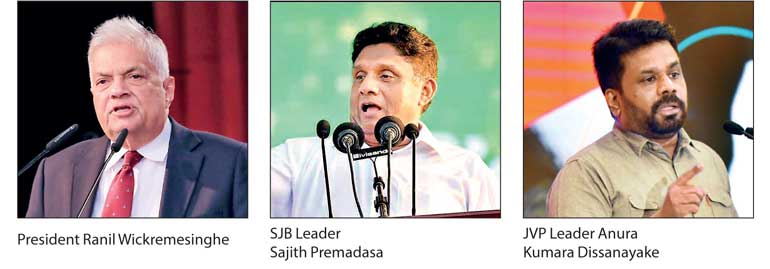Thursday Feb 19, 2026
Thursday Feb 19, 2026
Friday, 21 July 2023 00:20 - - {{hitsCtrl.values.hits}}

 There is a big risk that Sri Lanka may fall into another phase of bankruptcy if the current program prepared and implemented according to the IMF guidelines to overcome the bankruptcy facing the country collapses in the event of a change in the government in an upcoming election or due to any other reason. Obviously, it needs not to be reiterated that the recovery will be extremely difficult if such a situation occurs. In such an eventuality there will be a real danger of Sri Lanka falling into a long-term miserable situation that is not easy to overcome.
There is a big risk that Sri Lanka may fall into another phase of bankruptcy if the current program prepared and implemented according to the IMF guidelines to overcome the bankruptcy facing the country collapses in the event of a change in the government in an upcoming election or due to any other reason. Obviously, it needs not to be reiterated that the recovery will be extremely difficult if such a situation occurs. In such an eventuality there will be a real danger of Sri Lanka falling into a long-term miserable situation that is not easy to overcome.
It is very rare that a country goes bankrupt and it could be described as a very unfortunate and terrible situation that a country has to face. In such a situation, the political parties have a special responsibility to work together regardless of their political differences and parochial interests. But the mainstream political parties in Sri Lanka have failed to realise that the crisis facing the country is a serious and complex issue that needs to be overcome by a common consensus of all political parties. The political parties of our country lacked the wisdom and the discipline to apprehend the intensity of the crisis and act accordingly.
It does not imply that all the political parties should have backed up naively and uncritically the program adopted by President Ranil Wickremesinghe in conjunction with the Central Bank, which was based on the guidelines of the International Monetary Fund (IMF). It should have been implemented by common consensus after subjecting it to review and debate by all the political parties, thereby adopting a program acceptable to all. However, the opposition political parties in Sri Lanka did not have the wisdom or sense of civility required for arriving at such a consensus. It does not mean that the ruling party is in an immaculate and progressive state. In this particular issue, the behaviour of the opposition political parties was more backward and stupid than the ruling party which had reached an outdated level.
If the main Opposition party had the wisdom, what it should have done was to make use of this opportunity to formulate a reform program aimed at recreating the entire socio-political system which is outdated and corrupt and force the Government to implement it with general consensus rather than limiting the issue only to resolving the balance of payments crisis. The President had expressed his desire for a reformation program that would include the views of everyone. He had also expressed his wish to involve the United Nations also, as an observer in the reform program. But the country lost the opportunity to have a reform program initiated because the opposition political parties refused to cooperate and continued to follow a policy of evading it.
If the Opposition had been able to open up the space for reconciliation without being unnecessarily factional and greedy for power, it would have been possible to have had a far reaching and lasting reforms program. Further, It would have been possible to achieve a proper order and a system in the way the affairs of the country was taking place whilst improving the progress that Sri Lanka is currently enjoying by two to three times more. If that was the case, a general consensus could have been reached for a reform program leading to a profound change in the system which includes important progressive elements such as building a modern nation, eliminating corruption and inefficiency, recreating the state to suit the modern needs, and formulating a participatory Constitution that puts more weight on the public.
During this crisis the Janata Vimukthi Peramuna (JVP) may have made some stride in terms of gathering a significant share of people’s power, but seen from an ideological point of view it has reflected a greater backwardness than progress. The JVP has done many things that a responsible political party should not have done during a national crisis. The leaders of the JVP continuously appealed to Sri Lankans working in foreign countries not to remit their overseas earnings to Sri Lanka. It was also against working with the International Monetary Fund during this crisis. It followed a policy of frightening the depositors in the Government’s plan to restructure domestic debts. It seems that the JVP has followed a policy of seizing the ruling power driven by a narrow sense of hunger for power even at the cost of pushing the country to a state of bankruptcy again. The criticism made by a leader of JVP about the Japanese Light Rail Transit project (LRT) which was suspended by the Gotabaya Rajapaksa administration, could be considered as a significant occasion that showed the narrow and chaotic nature of the way it thinks.
The JVP being a party that has not abandoned Marxism completely, it is not difficult to understand the extremist behaviour of it. The way the Samagi Jana Balawegaya (SJB), the main opposition party, acted during this crisis cannot be said to be intelligent or wise. It has failed to convince the people of the country that it is the best option for them to select next. There were times when the JVP did things and ended up being a source of ridicule. Similarly the SJB too, having said that it would support the IMF program, followed a practice of scaring the public.
Also it made everything possible to thwart the creation of a reform program based on consensus. A large number of members of SJB showed great interest in joining the proposed reform program, but the party leader followed a strict policy that did not allow it. During the Aragalaya, the SJB even had a dream of usurping the power illegally. By that, it followed a policy that strengthened anarchy rather than strengthening democracy. The SJB had to pay a big price for all these opportunistic mistakes it has made. The public acceptance of the party has deteriorated in the face of such stupid actions committed by it.
It must be said that the picture of the immediate future of Sri Lanka does not seem to be good for the benefit of the country. The political picture of the country is such that no party would be able to secure a clear majority in an election. If the present chaotic political environment leads to a situation in which no party could secure a clear majority, there looms a real danger in which the IMF program implemented to overcome the balance of payments crisis might collapse and the country will be plunged into a state of bankruptcy again in the anarchic environment created in the process. How could the occurrence of such a situation be avoided?
It is necessary to pay special attention to such a terrible eventuality from now on. It is necessary to focus the attention of the political parties, scholars and the public towards it. How the future affairs should be carried out in a manner that would ensure the reform program implemented to overcome the balance of payments crisis will not collapse, and the country is prevented from falling into a state of bankruptcy again under any circumstances and the elections necessary for a democratic well-being are held. What are the views and ideas of the political parties in this respect? What are the opinions of scholars, professional organisations and public organisations? Isn’t it necessary to adopt a political consensus to ensure that Sri Lanka would not fall into a state of bankruptcy again under any change that may occur politically? If necessary, how should it be adopted?